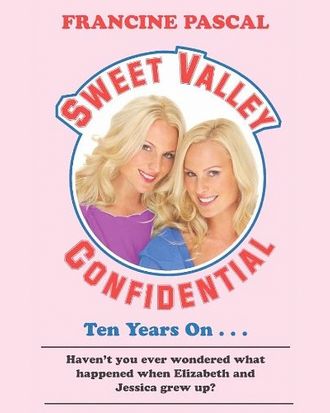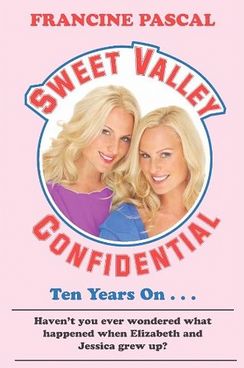

Some people never change, and the blonde and beautiful Wakefield twins, the protagonists of Francine PascalÔÇÖs long-running Sweet Valley franchise, have always been two of them. That Elizabeth and Jessica are always themselves ÔÇö alternately good and not-so-good ÔÇö would seem to be a big selling point of Sweet Valley Confidential, the ten-years-later follow-up to the Sweet Valley High series, since most people who will be reading it will be doing so out of a sense of nostalgia, and the twins should be as they were. Alas (and as if it needed saying), never changing from the person you were in middle school is actually a fairly dark turn of events. Sweet Valley Confidential is a shlocky nostalgia fest Trojan-horsing a downer perspective on what it means to be stuck forever and always with the immutable parts of your personality.
The Sweet Valley High series was, in the preÔÇôGossip Girl era, the most risqu├® tween series on the market. While the babysitters babysat, and the box-car children lived in a box car, the twins and their peers dealt with date rape, bulimia, cancer, car accidents, and drama. In the new books, the references have been updated ÔÇö the girls listen to Beyonc├® and talk about Perez Hilton and sometimes cry after their orgasms ÔÇö but the drama remains the same. The novel begins eight months after the twins have had a huge falling-out. [We will now lay out the bookÔÇÖs plot in detail, so SPOILER ALERT] Elizabeth has discovered that Jessica and ElizabethÔÇÖs fianc├®, Todd, are in love. Devastated, Elizabeth has moved to New York, gotten a job at a plausibly shitty theater publication (the Zagats of theater reviews), and now spends all her time screening her sisterÔÇÖs phone calls and feeling betrayed and wretched. Back in California, Todd and Jessica also feel horrible, but not as horrible as Elizabeth, since they openly acknowledge they arenÔÇÖt as good of people as Elizabeth, and because they have each other and are boinking all the time.
For those familiar with the earlier books, these plot developments arenÔÇÖt that surprising. Elizabeth has always been the good twin, and Jessica the bad one. Elizabeth was the caregiver, the maternal figure, the eternal martyr, the responsible one, and Jessica was the caretaker, the naughty kid, the sexy kid, the one who always asks for and gets what she wants. It seems like a testament to the basic sweetness of teenage girls that do-gooder Elizabeth was the preferred twin for what we assume was at least half of the Sweet Valley High readership, until you remember that Elizabeth always had the aspirational trump card: the steady boyfriend, Todd. Good girls may not have all the fun, but they do have future husbands.
That most people reading Sweet Valley Confidential know all of this about the twins, because they read at least one of the earlier books, means the plot of SVH is more than just absurdly dramatic in the way of one-off chick lit: It also has some sentimental heft. (While also being absurdly dramatic. Plus, in the parts that Jessica narrates, the author continually inserts Valley Girl ÔÇ£likesÔÇØ in the most implausible places, like, as if there was no one around to tell her where they should go.) We know these girls, and we have for a long time, and so their problems are more interesting than those of strangers. Can bad-girl Jessica figure out how to have a good girlÔÇÖs relationship, while being permanently, deservedly branded a horrible person? Can Elizabeth face the fact that being a good girl got her fuck-all?
As it turns out, no. No she canÔÇÖt. After a bit of mucking around with the possibility that their new circumstances could change the twins (Elizabeth gets drunk and talks to a guy in a bar like Jessica would; Jessica tries not to flirt with other men, like Elizabeth), the novel concludes that these women are who they have always been. Three-fourths of the way through, Elizabeth suddenly, immediately forgives Jessica, like a little robot whoÔÇÖs been programmed only to ever be nice.
This is how it happens: Jessica shows up at LizÔÇÖs house in New York and demands a hug. Elizabeth complies, and has a moment of epiphany: ÔÇ£For Elizabeth, holding Jessica was more than holding a sister. It was what she would feel had it been her child, and she understood now that short of the ultimate separation, she could never let go of Jessica. And she never wanted to. They have to find a way. Would Elizabeth ever learn and change and see the unfairness of the relationship? No. Love is not fair. Just undeniable.ÔÇØ So not only has Elizabeth realized she canÔÇÖt be without Jessica and decided to forgive her, when it comes to her sister, she will never ÔÇ£learnÔÇØ or ÔÇ£changeÔÇØ or even acknowledge the ÔÇ£unfairnessÔÇØ of their dynamic. She will never expect Jessica to be anything other than Jessica, the needy, selfish fianc├®-stealer. She will put up with that nonsense forever, and try very hard not to think about how self-abnegating that is.
This perspective on familial dynamics and personal pathologies is almost chilling, though of course itÔÇÖs not intended to be. The twins getting back together is supposed to be the bookÔÇÖs ÔÇ£happy ending.ÔÇØ They could hardly stay on bad terms, even though that is exactly what they should do (Jessica is truly a hose beast). To cover up for the fact that SVCÔÇÖs conclusion is, basically, that if you put up with other peopleÔÇÖs shit, put up with their shit so wholeheartedly that it becomes who you are (the worldÔÇÖs expert at putting up with shit) ÔÇö and thus becomes something you can take pride in ÔÇö it gives Elizabeth a carrot, by which we mean a man. Good girls still get husbands. (Come on, this isnÔÇÖt a tragedy.) Look out for the inevitable sequel to the sequel, in which the twins will both have babies and Jessica, being Jessica, will perform some heinous act of sabotage to keep ElizabethÔÇÖs well-behaved children out of the right preschool, and Elizabeth will pretend she didnÔÇÖt see the whole sordid thing. SheÔÇÖs Elizabeth, after all. She doesnÔÇÖt change.

